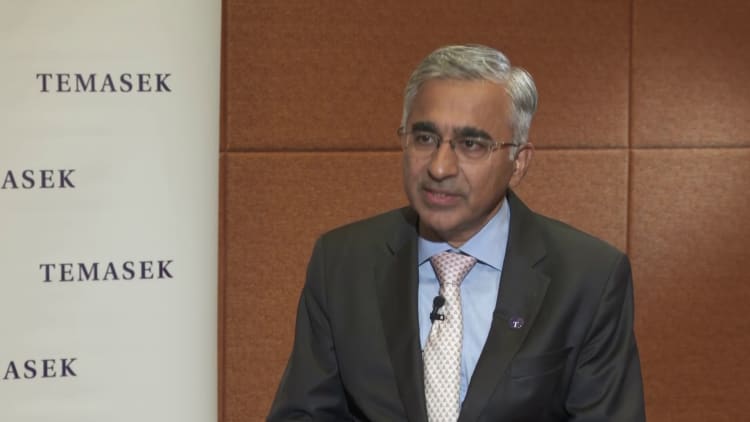
SINGAPORE — Singapore’s state-owned investment company Temasek posted its worst returns in seven years in 2023, weighed down by a challenging macroeconomic and geopolitical environment.
Temasek posted a 5.07% decline in its one-year total return for shareholders in Singapore dollars in the fiscal year ended March 31, according to a statement released Tuesday. This was the worst annual return for Temasek shareholders since 2016 and only its fifth negative one-year return since 2003.
“We have a predominantly stock portfolio, so we cannot be immune to market movements,” Temasek’s chief investment officer Rohit Sipahimalani told CNBC.
He S&P 500 and the benchmark MSCI Asia ex-Japan indices each plunged nearly 20% in 2022, rocked by sticky inflation despite multiple rate hikes by central banks. Intensifying geopolitical tensions, such as the US-China tensions and the Russia-Ukraine war, also added to the unprecedented mix of complexities.
Temasek’s net portfolio value was S$382 billion ($287 billion), compared with S$403 billion a year ago. It also posted a group net loss of $6 billion, which was its first in at least a decade.
Still, Temasek’s declining annual shareholder return in 2022/23 compares relatively favorably with global stock market returns.
Temasek Holdings posted a 5.07% decline in its one-year total return for shareholders in Singapore dollars in the fiscal year ending March 31, 2023, according to a statement released Tuesday. The net value of the portfolio came to S$382 billion, compared to S$403 billion a year ago. This was only its fifth total negative return to shareholders in a year since 2003.
Roslan Rahman | Afp | fake images
“Going forward … it depends on how the market does. We expect to be more resilient than the market,” he told CNBC’s Sri Jegarajah on Thursday. “If there’s a recovery in the market, we’ll do well. And if not, we expect that we’re still building a portfolio that doesn’t have a one-year outlook, but a five- to 10-year outlook.” “
Singapore’s state investor invests in both public and private markets. Unlisted assets comprised 53% of its portfolio as of March 31, generating higher returns on listed assets. Marking its portfolio off-market would provide an increase in value of S$18 billion, he said.
Its three-year total shareholder return was 8%, while its 10-year return was 6% and its 20-year return was 9%.
portfolio settings
The confluence of multiple global events in the past year has raised the cost of capital and affected capital flows, the Singapore state investor said.
“It also had an impact on the pace of the energy transition, in the face of increased demand for energy security and resilience,” Temasek added.
Temasek said its global direct investments, particularly in the technology, healthcare and payments spaces, saw “a reversal of earnings” in the 12 months ended March 31, as valuations eased in the interest rate environment. higher interest.
Temasek said it has consequently slowed its pace of investment in the past year and has taken a cautious approach as liquidity has tightened. Invested $23 billion and divested $20 billion, resulting in a net investment of $3 billion.

Still, Temasek said it has made new investments in payments platform Stripe as well as IT security provider Kaseya. That investment, in turn, enabled the acquisition of Datto, a provider of security and cloud-based software solutions.
Temasek said it increased its stake in Mastronardi, a Canada-based company that grows and distributes fresh produce grown in greenhouses.
The Singapore state investor said it cut its portfolio exposure to financial services to 21% in 2022/23 from 23% a year earlier. It also increased its exposure to transportation and industrials to 23% from 22%. These two sectors are the largest in his investment portfolio.
Early-stage investments are capped at 6% of your portfolio, Temasek said.
Facing forward
In November, Temasek noted down his $275 million investment in failing cryptocurrency exchange FTX.
He subsequently cut compensation in May for the team that recommended his investment in the now-bankrupt FTX cryptocurrency exchange, as well as his senior management team.
“I would say that we have never been looking to invest in cryptocurrency,” Sipahimalani said.
“There is a lot of regulatory uncertainty in this environment,” he added, saying it would be “very difficult” for Temasek to make another investment in cryptocurrency exchanges.
Sipahimalani said the state investor is looking for greater portfolio resilience in the face of market volatility brought on by current global complexities.
India and Southeast Asia are geographic areas where Temasek is looking to increase investments, he said.
“India is about 5% of our portfolio today. We are looking to increase that and have been increasing our investments in recent years,” Sipahimalani said.
“Southeast Asia is even smaller, we want to grow it relatively compared to India. The size of the public markets is not that big. So it’s harder to find scale opportunities to do that,” he added. “But we are actively working on it.”
He pointed to Vietnam, which he says will benefit disproportionately from some of the regionalization of supply chains.
Sipahimalani also said that any recession would present investment opportunities for Temasek.
“We think a recession is probably needed to bring inflation down to acceptable levels,” the CIO said.
“Actually, I think any downturn will be mild because of the strong balance sheets at the consumer and corporate level. And that, I think, would be an investment opportunity for us if you see those [market] corrections”.